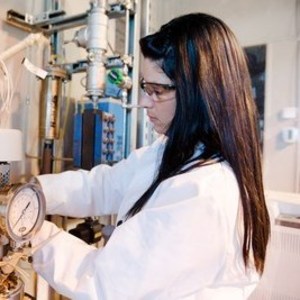Enerkem produces a new high-octane biofuel

Enerkem
March 21, 2018
BY Enerkem Inc.
Enerkem Inc., a world-leading waste-to-biofuels and chemicals producer, announced March 20 during the 255th American Chemical Society national meeting being held in New Orleans, that it had succeeded in producing a new high-performance biofuel that could improve the octane rating of fuels sold on the market and reduce their carbon footprint.
The chemical engineering expertise at Enerkem's Innovation Centre in Westbury, Quebec, allowed the company to successfully develop a process that uses its proprietary waste-to-biofuel technology to produce a new biofuel with a research octane number (RON) of up to 112. This is 20 points higher than the average octane rating found in regular motor gasoline. By using bio-dimethyl ether (bio-DME), a product derived from Enerkem's biomethanol, combined with a DME-to-high-octane-gasoline catalyst developed by the National Renewable Energy Laboratory in the United States, the Enerkem-NREL team were the first to demonstrate at pilot scale the production of an alternative fuel rich in paraffins.
Advertisement
"It's a major breakthrough that could enable the development of a new non-oxygenated biofuel made from waste on a commercial scale," explained Stéphane Marie-Rose, director of Enerkem's Innovation Centre. "Through the very selective catalytic reaction achieved using our waste-to-biofuels process, we have formed paraffinic molecules, such as triptane, whose properties already contain a high-octane rating, thereby increasing the volume of paraffins when used as an additive in a conventional fuel."
In addition to the various environmental and economic upsides, there are many possible applications for a high-octane biofuel derived from Enerkem's bio-DME. The non-oxygenated additive could serve the specialized fuels market, such as the aviation gasoline and professional motorsport sector. As with the biomethanol and advanced ethanol produced today at commercial scale by Enerkem, this new biofuel allows better combustion, replaces fossil fuels and reduces greenhouse gas emissions.
Advertisement
Enerkem's Innovation Centre intends to build on this technological advancement by further developing and optimizing the process as well as evaluating the potential commercial applications in the coming months.
Related Stories
Marathon Petroleum Corp. on Aug. 5 released second quarter financial results, reporting improved EBITDA for its renewable diesel segment. The company primarily attributed the improvement to increased utilization and higher margins.
Chevron Corp. on Aug. 1 confirmed the company started production at the Geismar renewable diesel plant in Louisiana during the second quarter after completing work to expand plant capacity from 7,000 to 22,000 barrels per day.
The public comment period on the U.S. EPA’s proposed rule to set 2027 and 2027 RFS RVOs and revise RFS regulations closed Aug. 8. Biofuel groups have largely expressed support for the proposal but also outlined several ways to improve the rulemaking.
In celebration of World Biodiesel Day, MOL Group on Aug. 8 announced SAF was successfully produced for the first time at INA’s Rijeka Refinery during a pilot project to process biocomponent. Renewable diesel was also produced.
Iowa farmers have a new market opportunity for their 2025 soybean crop. Landus is expanding its Clean Fuel Regulation initiative, made possible by recent policy changes expected to increase Canada's demand for liquid biofuel.
Upcoming Events










